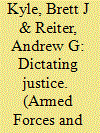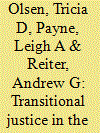|
|
|
Sort Order |
|
|
|
Items / Page
|
|
|
|
|
|
|
| Srl | Item |
| 1 |
ID:
109944


|
|
|
|
|
| Publication |
2012.
|
| Summary/Abstract |
Militaries throughout the world operate their own courts to prosecute military crimes, such as insubordination, that are not part of civilian legal codes. Latin American militaries traditionally have extended this hermetic justice system to cover all crimes committed by their personnel, allowing the institution to sit in judgment of its own actions and escape punishment for human rights violations. This parallel legal system erodes the principle of equality before the law, threatens civilian control of the military, and nurtures a culture of impunity. This article develops a theoretical model to explain the state of military court jurisdiction over military personnel for human rights violations in democracies. It then empirically tests this model on seventeen cases in Latin America. The article concludes that the variation in reform of military courts is a result of the relative balance between the extent of military autonomy and the strength of the civilian reform movement.
|
|
|
|
|
|
|
|
|
|
|
|
|
|
|
|
| 2 |
ID:
144447


|
|
|
|
|
| Summary/Abstract |
Scholars and policymakers argue that violent actors – termed ‘spoilers’ – pose a significant threat to civil war peace agreements. Yet existing research, which is overly reliant on single-case studies, has not effectively determined how prevalent spoiling is, or thoroughly examined what its ultimate effects are on peace agreements. This article draws on a newly constructed cross-national dataset of spoiling following 241 civil war peace agreements in the post-Cold War era to analyze spoiling. It finds that spoiling intended to terminate an agreement is not as common as typically assumed, but still plagues a sizeable number of peace agreements. Moreover, most actors who resort to this strategy typically fail in their goals and the agreement is not at risk, despite the high publicity and attention given to these threats. Yet particular types of actors, most notably paramilitaries and state security forces excluded from the agreement, can pose a significant threat to peace.
|
|
|
|
|
|
|
|
|
|
|
|
|
|
|
|
| 3 |
ID:
101697


|
|
|
|
|
| Publication |
2010.
|
| Summary/Abstract |
This article presents a new dataset of transitional justice mechanisms utilized worldwide from 1970-2007. These data complement the growing body of quantitative and comparative analyses of transitional justice. This article summarizes three important contributions made by the dataset. First, it includes five transitional justice mechanisms (trials, truth commissions, amnesties, reparations, and lustration policies), allowing scholars to avoid many of the methodological errors committed by performing single-mechanism studies. Second, it provides an expanded sample, both temporally and geographically, to facilitate greater comparative and policy impact. Third, the dataset enables scholars to analyze transitional justice across a variety of political contexts, including democratic transitions and civil wars. These data illuminate a new set of general trends and patterns in the implementation of transitional justice worldwide. The findings show that countries adopt amnesties more often than other mechanisms. They predominantly grant them in the context of civil war and to opponents of the state, rather than state agents. Courts rarely prosecute those currently in power for human rights violations. In civil war settings, rebels, rather than state actors, face trials. In post-authoritarian settings, courts try former authoritarian actors, but do not address crimes committed by the opposition to authoritarian rule. The dataset also reveals regional patterns of mechanism usage. Trials, lustration policies, and reparations occur most often in Europe. Non-European countries more frequently adopt truth commissions and amnesties than do their European counterparts, with a particularly high number of amnesties granted in Latin America.
|
|
|
|
|
|
|
|
|
|
|
|
|
|
|
|
|
|
|
|
|